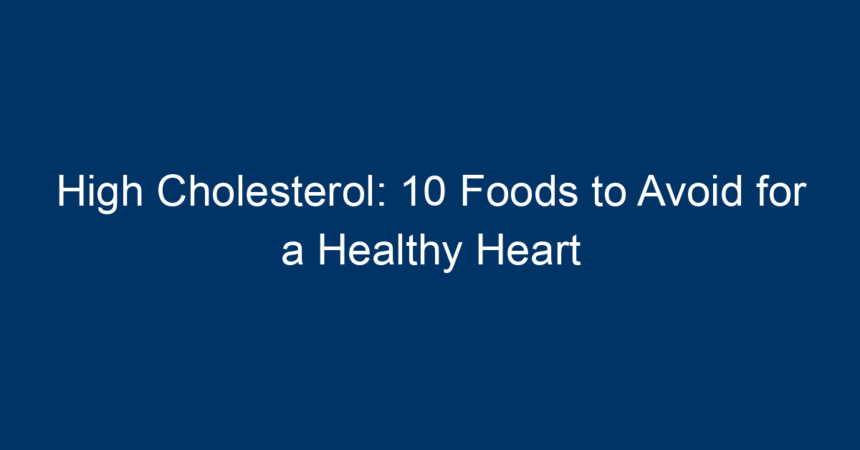Maintaining a healthy heart is crucial in today’s fast-paced world, and understanding the link between diet and high cholesterol is fundamental. High cholesterol levels can lead to serious health problems, including heart disease, stroke, and other cardiovascular issues. To protect your heart, it’s essential to know which foods can contribute to rising cholesterol levels. In this article, we’ll delve into 10 foods you should avoid to maintain healthy cholesterol levels and support overall heart health.
Understanding Cholesterol: The Good and the Bad
Before we dive into the foods to avoid, it’s important to understand what cholesterol is. Cholesterol is a waxy substance your body needs to function properly. It is essential for building cells, producing hormones, and aiding digestion. However, there are two types of cholesterol: Low-Density Lipoprotein (LDL), often referred to as "bad cholesterol," and High-Density Lipoprotein (HDL), known as "good cholesterol."
Experts recommend keeping LDL levels low while increasing HDL levels for optimal heart health. When LDL levels are high, it can lead to plaque buildup in arteries, increasing the risk of heart disease. The good news? Diet plays a vital role in managing cholesterol levels.
1. Trans Fats
Trans fats are found in many fried and commercially baked products. They are created through a process called hydrogenation, which solidifies liquid oils. This process not only increases shelf life but also increases LDL cholesterol levels while lowering HDL cholesterol. Foods like doughnuts, cookies, and certain margarine brands often contain trans fats. For a heart-healthy diet, always check food labels and avoid anything that lists "partially hydrogenated oils."
2. Red Meat
While red meat is a great source of protein and iron, it can also be high in saturated fats, which can elevate LDL cholesterol levels. Processed red meats, such as bacon, sausages, and deli meats, are particularly concerning due to their additional fats and preservatives. Instead, consider lean protein alternatives, such as chicken, fish, or plant-based proteins like beans and lentils.
3. Full-Fat Dairy Products
Cheese, butter, and whole milk may be delicious but contain high levels of saturated fats, contributing to high cholesterol. Though dairy products can be part of a balanced diet, opting for low-fat or fat-free versions can help you maintain healthier cholesterol levels. For those who are lactose intolerant, numerous plant-based milk alternatives are available that are low in saturated fats.
4. Fried Foods
Fried foods are not just high in calories; they often contain unhealthy fats that can raise your LDL cholesterol. Whether it’s fried chicken, french fries, or onion rings, these foods should be consumed sparingly if you want to keep your cholesterol levels in check. Instead of frying, consider grilling, baking, or steaming your food to keep meals both healthy and delicious.
5. Processed Snacks
Many processed snacks like chips, crackers, and microwave popcorn are loaded with unhealthy fats and additives. They often contain high levels of trans fats and sodium, which can not only elevate cholesterol levels but also increase blood pressure. When snacking, choose whole foods like fruits, vegetables, or nuts instead.
6. Refined Carbohydrates
While carbohydrates are essential for energy, refined carbs can adversely affect cholesterol levels. Items like white bread, pastries, and sugary cereals can lead to rapid spikes in blood sugar, inflammation, and increased cholesterol. Opting for whole grains like oats, quinoa, and brown rice can provide fiber and nutrients that help maintain balanced cholesterol levels.
7. Sugar-Sweetened Beverages
Soft drinks, sweetened teas, and energy drinks are among the leading sources of added sugar in diets today. These sugar-laden beverages contribute to weight gain and can lead to high cholesterol and insulin resistance. Instead of reaching for sugary drinks, water, herbal teas, or naturally flavored sparkling water can be excellent alternatives.
8. Highly Processed Foods
Many convenience foods are heavily processed and contain unhealthy levels of sugar, unhealthy fats, and additives. Items like frozen dinners, processed meats, and packaged snacks are often high in trans fats and added sugars. Whenever possible, choose fresh, whole foods that are minimally processed. Meal prepping can also help you avoid processed food temptation and make healthier choices.
9. Coconut Oil
Coconut oil has gained popularity in recent years, often touted as a healthier fat. However, it is high in saturated fats, which can increase LDL cholesterol levels. While moderate consumption isn’t harmful for most people, it’s better to use heart-healthy oils such as olive oil or avocado oil in your cooking and salad dressings.
10. Sauces and Condiments
Many sauces and condiments, particularly those that are commercially prepared, can be high in sugar, salt, and unhealthy fats. Ketchup, mayonnaise, salad dressings, and barbecue sauces often contain hidden sugars and unhealthy oils that can negatively affect cholesterol levels. Instead, consider making your own sauces using fresh herbs, spices, and healthy oils.
Actionable Tips for Heart Health
Now that you know which foods to avoid for managing high cholesterol, here are some actionable tips to help you adopt a heart-healthy diet:
-
Read Labels: Become savvy about food labels to avoid hidden sugars and unhealthy fats.
-
Incorporate Fiber: Foods high in soluble fiber can lower cholesterol levels. Include oats, beans, fruits, and vegetables in your diet.
-
Exercise Regularly: Physical activity can help raise HDL cholesterol and lower LDL cholesterol. Aim for at least 150 minutes of moderate exercise per week.
-
Stay Hydrated: Drink plenty of water and limit sugary drinks.
- Consult a Professional: If you have high cholesterol or are at risk, consult a healthcare provider or nutritionist for personalized dietary advice.
Conclusion
Managing high cholesterol is vital for heart health, and dietary choices play an essential role in this process. By avoiding trans fats, red meat, full-fat dairy products, and highly processed foods, you can take significant steps towards lowering your cholesterol levels and improving your heart health. Prioritize whole, minimally processed foods, exercise regularly, and remember: small changes lead to lasting health improvements. Make informed dietary choices today for a brighter, healthier tomorrow. Your heart will thank you!




